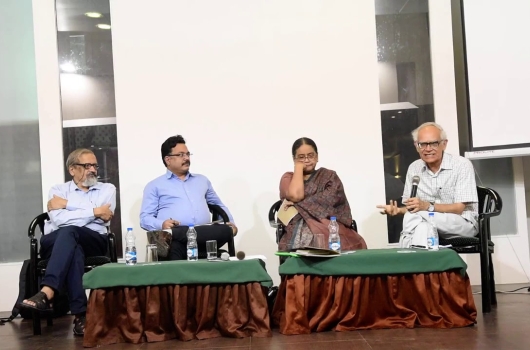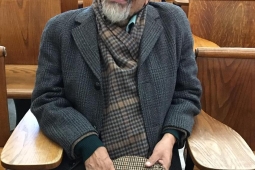
The Gentle Builder
Krishna Kumar, “The Gentle Builder: New pedagogic edifice that Hari Vasudevan helped shape will endure”, The Indian Express, May 14, 2020
Few people understand that developing a good curriculum is an act of negotiation. It involves bringing people with differing perspectives to probe their own positions. It requires that people look beyond the boundaries of their own disciplines, with curiosity and interest in subjects that others know better. This role can only be compared to that of an architect who recognises that the house to be designed today under adults’ orders and resources will shape the imagination of their children.
In the sudden death of Hari Vasudevan, at 68, India has lost more than a great historian and teacher. We have lost someone unique who understood the complexity of education as a social system.
That he lost his life to the coronavirus is brutally ironical. My last conversation with him, barely two weeks ago, was mostly about the virus. There was something warmly expansive about his conversational style. It gave a richer meaning and context to every topic. Corona was no exception.
His numerous colleagues and students will comment on his vast scholarship in history. I knew him as the gentle builder of a new pedagogic edifice that is sure to last. It was 2005 when Vasudevan played two key roles in the complex process of curriculum reform that the NCERT had undertaken. In the first, he was leading a vast team, designing a new syllabus for the teaching of social sciences at different levels.
His second role was to lead the various committees working to develop new textbooks in his own discipline, history, and in the other social sciences. The common perception was that the NCERT was going to “revise” the old textbooks. In the social sciences, Vasudevan realised, that a revised version of what existed would not serve India well.
The National Curriculum Framework (2005) created the occasion for a critical engagement with established pedagogic routines. The late Professor Yash Pal led the various groups which drafted this futuristic document.
It articulated a different way of looking at integrating knowledge and pedagogy. Once the NCF had been drafted, the NCERT’s anxiety shifted to locating people who could redefine the nature of each subject. The task in the social sciences was the toughest — to bring children into the centre of academic debates about truth and methods of pursuing it.
Vasudevan saw this task as a vast, systemic deliberation. The idea of child-centred learning at school demanded sophisticated bridging with college and university teaching. He engaged with this task by getting people to talk across the borders of their disciplines. He brought hundreds of professional scholars and teachers, illustrators and designers into a long and patient dialogue. In its geographical reach and conceptual intensity, this dialogue had no precedent in education and curriculum designing in India. How did Vasudevan succeed in pulling this dialogue through sharply-divided rival perspectives and assumptions?
The memory of his success, and now his memory as a person, offers me two clues. One, he liked people. While talking to him, people felt recognised. They could see that he was interested in how they explained their viewpoint. They stopped guarding their territory when they felt that he knew the importance of what they were saying. His other gift was in making conversation — any conversation — a means to explore life. Talking to him was like re-discovering one’s memory and interest.
His interest in people is rare in our ethos now. So was his acute awareness of the past, of how it impinges on life today across the world. In another country and time, he might have been a great diplomat. He was keen to hear every account of life, individual or collective. He was a professional historian, an archivist, an analyst of old documents, a traveller and a polyglot. These specialised tasks occupied him throughout life, in different parts of India and the world. Even a short meeting or talk with him created the feeling that history was in the making all the time — during our conversations too.
History was hardly a subject for him. He infused it with the exuberance of life, its daily warmth. For him, history meant learning to notice the spark that brings space and time, culture and work, ideas and people into a novel relationship. It takes its own time to come into public focus.
This article appeared in the print edition of May 14, 2020, under the title ‘The gentle builder’. Kumar is former director, NCERT and author of The Child’s Language and the Teacher


